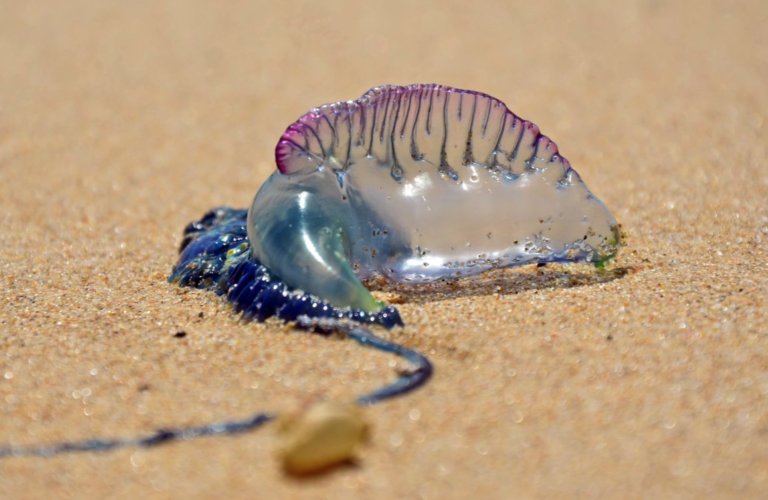Bluebottles are notorious for their painful stings and are usually spread across South African beaches at this time of year. Despite their small size, their sting can pack quite a punch, and may even cause serious complications for some.

Image: iStock
ALSO SEE: How to remove a tick safely from your body or pet
Here’s what to do if you find yourself stung by a blue bottle:
Find a safe place, don’t panic
If you’re stung by a blue bottle, stay calm. Panic can exacerbate symptoms. Find a safe spot to sit and avoid walking, especially if stung on your leg or foot, as movement may spread the venom further.
Remove and rinse, don’t rub
First, use tweezers or the edge of a rigid object to carefully remove visible tentacle fragments. Avoid using your bare hands, gloves are recommended if available. Once removed, wash the sting site gently with seawater to remove stinging cells. Try not to rub – this will aggravate the pain and may cause venom to spread even further.
Determine whether you need medical attention
You will need to visit a doctor if:
- The sting covers a large area, such as most of an arm or leg.
- You’ve been stung in a sensitive area like the eyes or mouth.
- You experience symptoms of an allergic reaction, such as difficulty breathing or chest tightness.
Does peeing on a bluebottle sting help?
Contrary to popular belief, urine is not really an effective treatment for bluebottle stings. The high water content in urine dilutes any potentially beneficial compounds like ammonia or urea, rendering them ineffective. Worse, urine may irritate the skin further or spread venom.
Managing the pain
Hot water treatment: Soak the affected area in hot water (around 42–45°C or as hot as you can tolerate) for 20 minutes. Heat helps neutralise the venom’s protein and alleviates pain.
Use a cold compress: If hot water is unavailable, a cold pack or cold water can reduce swelling and numb the pain temporarily.
Pain relief: Take an over-the-counter pain reliever to ease discomfort.
How to avoid being stung by a bluebottle
- Watch for bluebottles in the water or washed ashore, especially during onshore winds.
- Do not touch bluebottles, even if they appear lifeless on the beach.
- Consider wearing a wetsuit when swimming in areas known for bluebottles.
Bluebottle stings, while painful, are usually not life-threatening and can be managed with proper care. Always prioritise safety, and seek medical help if you experience severe symptoms.
Follow us on social media for more travel news, inspiration, and guides. You can also tag us to be featured.
TikTok | Instagram | Facebook | Twitter


















